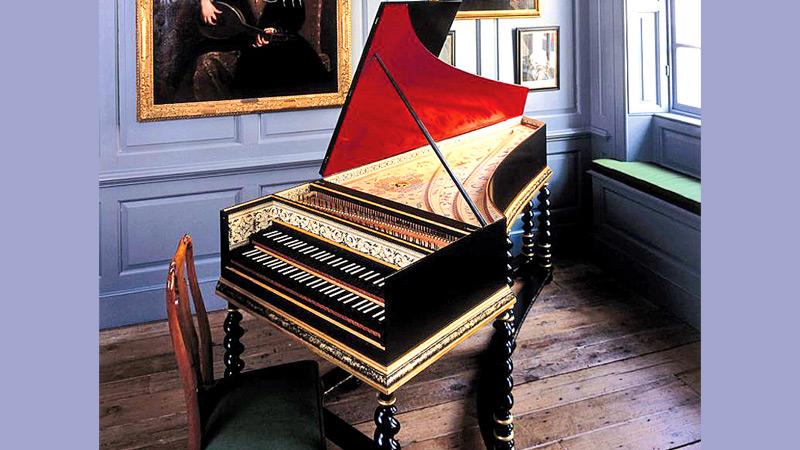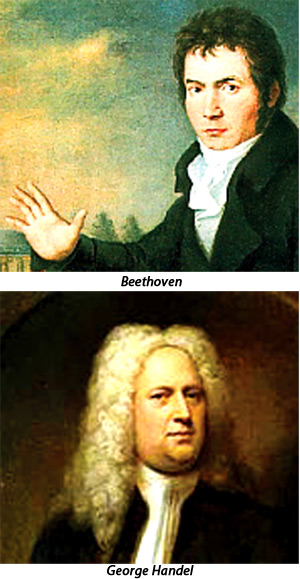
Those two iconic Masters were born within a year and a month apart in 1635. Irony is that both never met each other or attempted to do so for reasons of their own.
While Beethoven opted to remain in Germany, Handel spread his wings across the world until he roosted in England.
 Handel’s father who was valet/barber/surgeon to the Prince of Saxe-Magdeburg was in his mid-sixties when he was born and who disliked music or its sounds.
Handel’s father who was valet/barber/surgeon to the Prince of Saxe-Magdeburg was in his mid-sixties when he was born and who disliked music or its sounds.
But that did not put off the young Handel whose mother compensated to it by hiding the spinet he practised on, in the attic, smothered in clothing so that the sounds muffled.
But the young prodigy flourished from the beginning and became the greatest keyboard specialist of the day... and it happened almost overnight.
One Sunday morning the Duke of Saxe-Weissenfels heard the young Handel play the organ and was very impressed and filled they young organist’s pockets with gold coins and made arrangements to further his studies.
He was put under the care of Fredrich Zacchow who was the organist of the Lutheren Church who soon realised the genius of his child prodigy.
He confessed he had nothing to further his genius because the boy was so advanced and just eleven years old.
In 1707 after studying law for a while he abandoned it and opted to be the organist of the famous cathedral at Moritzburg. After that he moved to Hamburg, the seat of Opera. There he felt uneasy because of jealousy and petty cabals. He went over to Italy and turned to opera writing while in Florence and Venice.
There was no stopping or looking back for the composer as he moved from success to success until he came in contact with such figures as Corelli and Alexander Scarlatti.
He played ‘duets’ with them and they were the better harpsichordists while Handel the genius organist. Later, Scarlett was to admit that he had no conception of the power of the organ until he heard Handel play it.
From Italy Handel moved over to Hanover as the court elector and after a year, left for England where he wrote the opera, Rinaldo in 1711 which was a smashing success.
Not yet satisfied and after two years of absence from the Hanovarian Court, fate brought him to this great city.
By that time, Queen Anne had passed away and with no one to succeed it was left for the Elector of Hanover whom Handle had displeased when he left the court.
But great was Handle’s influence over him, he was invited back with a royal pension of £400 a year and an additional from the Prince of Wales amounting to a further £200.
With this money Handel was able to embark on a career of underwritten operas by the nobility with the finest European singers.
Thus in 1822 when the Royal Academy of Music was set up, he became the first artist director.
As he kept rising in virtuosity, people flocked to see him and hear his marvellous music while somewhere behind the scene something terrible was taking place.
As he reached the greatest of heights in so short a time, there was a cruel blow.... he became blind and was not able to cure it with the available faculties. And very strangely Bach who was born with him was also struck with blindness at the same time by the same quack surgeon who operated on both. Undaunted by his blindness, Handel continued to play that arose a wave of sympathy as more and more people flocked to see him play to accompany tenor, John Beared and many others.
Handel played till death claimed him and though he opted for a private burial, there were over 3,000 people to pay their respects for this wondrous composer.
A monument was erected showing at his working with the score of Messiah open with the inscription: ‘I know that my redeemer lives’
His music is most known as the composer of the imperishable sacred Messiah and the water and fireworks music.
The memo ability may be rivalled by his other choral music, or the large and magnificent oratorios on biblical subjects but remain apart from English choral traditions.
He is rated as one of the most popular from the Baroque/Classical era (1600 to 1820)
Essential Scores
Vocal- The best way to understand his wondrous vocal writing is in snippets. Messiah, the sacred cantata of 1741 includes every valley shall be exalted for unto us a child is born, how beautiful are the feet, I know that my redeemer liveth and the trumpet shall sound.
Israel in Egypt - Oratario (1752) I will sing unto the Lord and the people shall hear and be afraid.
Judas Maccabaaeus-Oratario (1747) ‘Sound an alarm’.
Xerxes- Opera (1738 ‘Ombra maifu’ is among the best known universally and known as Handle’s largo.
Zadok the priest-Anthem (1727) ‘Love in the eye sits playing’ and the first four anthems written for coronation of George 11 and later heard at every coronation.
Chandos Anthems-(1717 - 20) Was written when Handel was the composer in residence at home of the Dule of Chandos.
Instrumental
Water music-(1717)
To accompany a royal trip up the River Thames, can be heard in a suite of twenty short pieces best played in a version of five orchestral movements
Music for royal fireworks- (1749)
Uncomplicated joyful suite of six movements.
Organ concertos op. 4 and Op.7- (1738)
He wrote these two sets of six concertos as interludes for his ontarios.
Harpsichord suite No. 5 in E- (1720)
It is also called the Harmonious Blacksmith.
Arrival of Queen Sheba- (1749) Cross section of Handel’s works, culled and overblown from the Messiah, hopping up and down in big choruses.
Come November, if Covid-19 is gone forever and travel restriction are lifted, I will visit Handle Museum as usual on my agenda.
